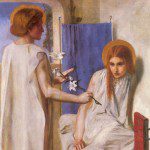Seekers and Guides is a new column by Sable Aradia! Follow it via RSS or e-mail, or look for it on alternate Mondays.
Merry meet! As a Witch who spends a great deal of time and makes some of her living by teaching Wicca, I’ll be writing this column to offer advice, discuss controversies, and find solutions for both teachers and students of the Craft. While my writing will primarily be from the Wiccan perspective because that is the path that I practice, much of it will overlap other Pagan faiths and will be relevant to Pagans of many stripes. My perspective will address both individuals and the community as a whole. And of course, this column will express only my own opinions.
I’m sure you’ve seen guides for finding a teacher all over the net. Most of them are geared towards protecting yourself from a potential cult leader. While this is certainly valuable to keep in mind, I’m beginning to think it does more harm than good. I don’t believe that most people who are offering to teach the Craft are intending to make a cult of acolytes to do their bidding. Witches are cheap . . . er, I mean frugal; they don’t trust authority; and because there’s so much involved in Wiccan practice, setting up a cult would be way too much work. There are much better arenas if cult leadership is your goal.
I find that with the late great Isaac Bonewits’ Cult Danger Evaluation Frame as our primary guide for how to find instructors, potential students often come to would-be teachers with immediate hostility and distrust. This isn’t going to help anyone. If you go to someone for instruction, I would hope that you like what they have to say and believe that they have something important that you can learn! Don’t make the mistake of going to teachers just because they claim to have a Third Degree in the Ancient Tradition of the One True and Right Way to Practice Witchcraft. Maybe they even do, but that doesn’t mean that you’re going to like that tradition, or that you’re going to fit well with the ones who are teaching it. More, I think, than in any other faith, Wicca requires a personal relationship between Seeker and Guide. Get to know your teacher first.
On the other end of the extreme, sometimes students are looking for gurus. I’m here to tell you that no Witch in the world has it all figured out. Especially because we are individualists by nature, and because we are “mystics in the world” who tend to be immersed in the human experience, most of us, even those who have been doing it for a very, very long time, have behaviors and habits that are less than perfect. Perfection is not the goal in Witchcraft; we seek to live in harmony with the world and find enlightenment in that, and we also value the individual experience. Try not to be too judgmental.
At the same time, use your discernment. One big problem in our community is that we have no firm requirements of our teachers. Often, people mean well but begin to teach before they are truly ready. You will be asked to challenge your perspective and open your mind in the practice of Witchcraft, but if you can’t believe what a potential instructor is saying, study somewhere else. And if you don’t think they have their feces coagulated, how can they help you figure out yours?
Feel free to ask about a teacher’s credentials. We don’t usually have a formal training program but there are some elements to look for (and avoid). Good answers include several years of practice, information about where our training was received that makes sense (such as completion of the very thorough Reclaiming / Witchcamp course in becoming a teacher or a second or third degree in a tradition that’s been around for a while and can trace its origins to something you’ve heard of), and prior experience in teaching or coven leadership. Good answers also include admitting one’s limitations. Youth, limited length of practice, a restricted perspective and primarily solitary study can all hamper one’s potential as an instructor, but they aren’t insurmountable if the teacher admits to them as being limitations at the outset. If you come to study from me, for example, I will tell you that my tradition draws its origin and inspiration from British Traditional Wicca and incorporates elements of the women’s spirituality movement and the Reclaiming / Feri stream, but it isn’t any one of those so if you’re looking for that, you’ll want to study with someone else. Poor answers include claiming to be the “chosen one” in any way (ie. “I received my 99th degree initiation from the Queen of Heaven at the top of a mountain,” “I’m the only real Witch in town because only I have a Third Degree in the Original One and True Gardnerian Tradition,” “I’m the reincarnation of Merlin”); citing intellectual study over personal practice; and claiming infallibility or bragging about one’s connections or skills, especially if anything about that rings untrue. (I had a very amusing experience recently when someone came into my shop claiming to be a brilliant ritual magician and crowing about his practice with the Masons. The Masons will tell you that they are not an esoteric order. Check out the sidebar on the Grand Lodge of Canada’s official site.)
Last, keep in mind that once you’ve agreed to learn from someone, it was your choice. If you’re not going to do what they ask of you, don’t waste their time and yours. Do your homework and respect what they have to say, just as you would any teacher in an educational setting. You can always choose not to be there if you aren’t happy.
Next in “Seekers and Guides”: How to become a good Witchcraft teacher.
Blessed be,
Sable Aradia














